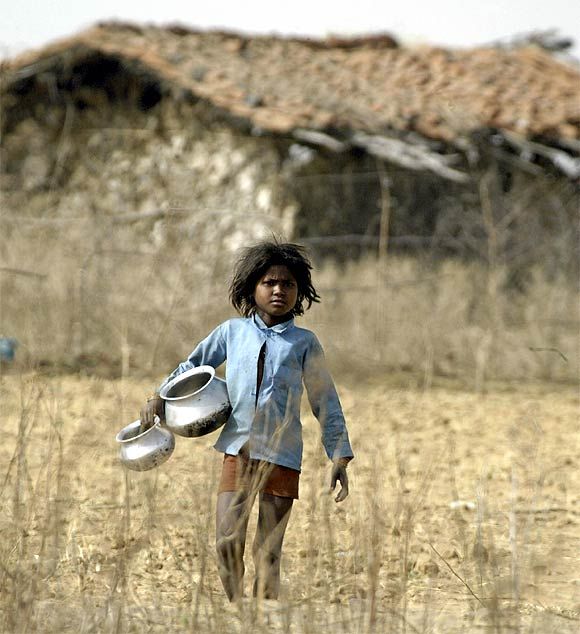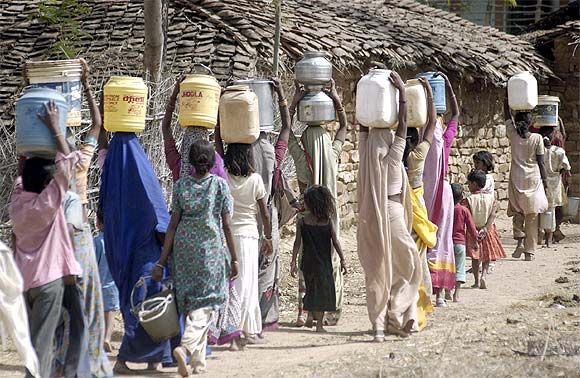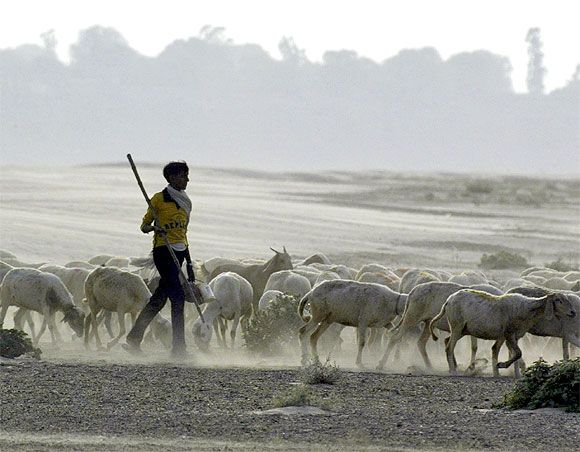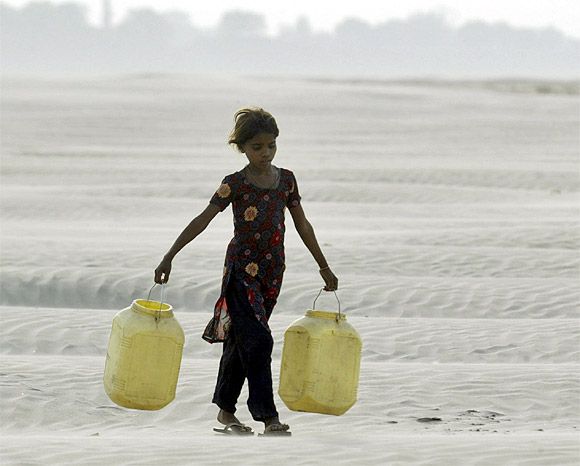'These people are living on the edge of starvation and governments need to show much greater compassion towards them.'
Rashme Sehgal reports for Rediff.com

The Sarai Kale Khan flyover is one of the busiest junctions in the nation's capital with thousands of cars, buses, scooter rickshaws, tempos and motorcycles plying over it day and night.
Over 300 families from the drought-ridden Bundelkhand region spread across Uttar Pradesh and Madhya Pradesh have sought shelter below the flyover for the last two months.
"We have come here in search of jobs. We have no work in our villages and if we do not find work, then like our dying cattle, we too will meet the same fate," says Dashrath, who belongs to Matraunie village in Sagar district, Madhya Pradesh.
Dashrath owns five acres of land. A farmer in Punjab owning three acres of land would be able to earn a decent income from a farm this size. But water-starved Bundelkhand has seen thousands of land-owning farmers and landless labourers, along with their families, pack their belongings into plastic gunny bags to make the tortuous journey to this city.
"We go to Nizamuddin station to get drinking water and we cook right here," says Dashrath, pointing to makeshift chullahs with firewood being used as fuel.
"I used to grow wheat, channa and vegetables on my land. But three years of consecutive drought has broken my back," says Dashrath who has left his elderly father behind in the village to take care of his land.
His children are mortified at Delhi's traffic as is his wife, so afraid if they stray onto the road, they could be run over.
Most of the families lie in the shade using the gunny bags as pillows on which they can rest their heads. The heat is intense, but their children sit uncomplaingly by their side.
Why did he not try for a job in Matraunie? "Ever since the Modi government came to power, there is no work for the panchayats and there is no work in MNREGA either," Dashrath says dispiritedly.
Sitting next to him is Suresh Kanchi Kushwal of Zilla Damo who owns half an acre of land. "I had several kathal trees growing on my land and I used to earn money from growing vegetables," says Kushwal.
Kushwal came to Sarai Kale Khan 12 days ago along with seven other families. "We desperately need work," he says. "But I have no ration card, no Aadhar card and no ID proof." He could not get any of these identity cards made in his village, because he alleges the patwari and some other panchayat members demanded a bribe of Rs 2,000 to lend their signatures to the necessary documents.

Jeevan Bal Chaudhury from Bundelkhand is a landless labourer who survives by doing mazdoori. "I move from place to place in search of work and for the last 20 days I have been walking the length and breadth of Delhi," he says. "I have three children to support."
Mohit, 11, Deepa, 10, and Omkar, 8 were all going to school, "but at present I cannot afford to educate them," says Chaudhury.
This large-scale exodus has had its fallout in Delhi's labour market. Kushwal was offered work by a local contractor. "I worked for him for three days, but when I asked for payment, he refused to give it. I have not seen him again," he says.
Dashrath describes how he and 22 men living here were taken to the town of Hapur in UP where they were told they would be paid Rs 300 per day as daily labourers while the rajmistris would be paid Rs 600 per day.
"After working for 20 days, we were paid Rs 100 a day while the mistris were paid as little as Rs 150 per day, so we all decided to come back here," he says.

The most alarming aspect of this migration, these families say, is that they have left their cattle behind.
"No shelters have been created for our cattle and they must have starved to death by now. There is no fodder for them to eat and no water for them to drink," says Dashrath, breaking into loud sobs.
Yogendra Yadav and his team from Swaraj Abhiyan have toured the Bundelkhand region extensively. "This is the worst cattle famine to have occurred in several decades," says Professor Yadav.
"We have calculated that 11,000 deaths of cattle are taking place every day which works out to three lakh (300,000) cattle deaths per month. The number of deaths of wildlife is also unprecedented," he says.
The migrants are anguished that no one from the local government has come forward to enquire about their plight.
"Not one government officer has come forward to assist us. Despite these high temperatures, they have not cared to send us one tanker of water. We have lactating mothers whose infants are just two to three months old," says a woman who refused to disclose her name.
Rajagopal P V of the Ekta Parishad, who undertook a padyatra in nine zillas in Bundelkhand and has held 40 public hearings during May and June, points out, "Despite a three year drought, it is business as usual for the government. Water has become a huge business with water tankers selling water to the public."
"The poor cannot afford to buy water," says Rajagopal, "and we are now witnessing mass migration in which already ten lakh (1 million) people have moved out of this region."
Harsh Mander, a Right to Food commissioner appointed by the Supreme Court, "finds an extraordinary absence of compassion at the sufferings being borne by one third of the entire rural population of the country. This has happened during a time when our farmers are in the throes of an intense agricultural crisis."

"Despite the enacting of the National Food Security Act," says Mander, "there is no pressure on any of the state governments or central government to enact it. The Supreme Court has ordered the distribution of free foodgrain in all the drought-affected areas, but this has also not been done. Rather, the Centre has asked states to buy foodgrain at Rs 15 per kilogram from it."
The farmers from Bundelkhand vouch that there is no universal access to foodgrain in their villages and no state government is anywhere close to implementing this critical directive for the mitigation of hunger.
Swaraj Abhiyan has conducted a survey across 109 villages in Bundelkhand. Some of the conclusions it arrived at were that only 5 per cent of villages in Madhya Pradesh's Bundelkhand region had jobs under MGNREGA while in UP's Bundelkhand region, the figure was at 29 per cent.
The reason for these low MGNREGA figures was that despite the government having made an allocation of Rs 22,000 crore (Rs 220 billion) for rural job employment, Rs 16,000 crore (Rs 160 billion) of this money was being spent on paying last year's dues.
Farmers in Saria Kale Khan complain that they have received no crop compensation for drought. "We farmers need credit to buy seeds for their next crop. We also need crop-loss compensation from the government to prepare our land especially since banks no longer give us loans," says Dashrath.
To highlight the farmers' plight, Swaraj Abhiyan, in association with Ekta Parishad, Jal Biradari and the National Alliance of People's Movements, had organised a 'Jal-Hal' yatra from Latur in Maharashtra to Mahoba in Uttar Pradesh between May 21 and 31.
Similar yatras were held in Telangana from June 2 to 4 and from Chambal to Bundelkhand between June 6 and 14 to assess the ground situation.
Drought relief monitoring across all 13 drought-hit states will be taken up and a report presented in the Supreme Court when the case comes up for hearing on August 1.
While that is important, immediate attention needs to be drawn to the plight of farmers who have migrated en masse under acute duress. No famine-related deaths are available with the central government.
"Some deaths must have occurred, but there are no figures available," says Mander, "These people are living on the edge of starvation and governments need to show much greater compassion towards them."











 © 2025
© 2025